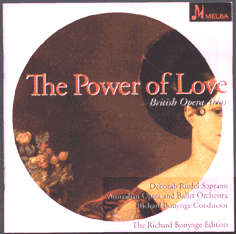THE POWER OF LOVE
BRITISH OPERA
ARIAS
The Night Winds: Lurline (Wallace) (1860)
Placida Notte: Il Talismano (Balfe) (1870)
'Tis the Harp: Maritana (Wallace) (1845)
'Twas in that Garden: The Siege of Rochelle (Balfe) (1835)
Nella Dolce Trepidanza: Il Talismano (Balfe) (1870)
Lord of our Chosen Race: Ivanhoe (Sullivan) (1891)
'Neath My Lattice: The Rose of Persia (Sullivan) (1898)
Scenes that are Brightest: Maritana (Wallace) (1845)
Little Princess: Amassis (Faraday)
The Convent Cell: The Rose of Castille (Balfe) (1848)
There's a Power: Satanella (Balfe) (1858)
The Rapture Dwelling: The Maid of Antois (Balfe) (1836)
Yon Moon o'er the Mountain: The Maid of Antois (Balfe) (1836)
Oh! Could I but his Heart enslave: Satanella (Balfe) (1858)
Bliss For Ever Past: The Puritan's Daughter: (Balfe) (1861)
The Naiad's Spell: Lurline (Wallace) (1860)
These Withered Flowers: Love's Triumph (Wallace) (1862)
My Long Hair is Braided: The Amber Witch (Wallace) (1861)
 Deborah
Riedel (soprano), Australian Opera & Ballet Orchestra/Bonynge
Deborah
Riedel (soprano), Australian Opera & Ballet Orchestra/Bonynge
Rec. St Scholastica Chapel, Sidney in August 1999
 MELBA
301082 [69.49]
MELBA
301082 [69.49]
from D1 Music Direct, 7 High Street, Cheadle, Cheshire. SK8 1AX
http://www.dimusic.co.uk/

"British Opera Arias" means here basically the two
Irish-born composers, Balfe (nine tracks) and Wallace (six), who from
the 1830s to the 1860s composed a considerable corpus of operas, usually
to English, but sometimes to French or Italian, texts. They achieved
notable popularity in their day and in the case of Balfe's The Bohemian
Girl and Wallace's Maritana, which were still being toured in the provinces
in the 1930s, for long after.
By and large both were influenced by Italian models - Rossini (especially
"The Rapture Dwelling in My Heart" from Balfe's The Maid of
Artois, produced in 1836; the otherwise useful insert suggests it is
like Gounod but he was barely 18 in 1836), Donizetti and early to middle
period Verdi, especially Balfe's Il Talismano, posthumously produced
in 1874, whose stirring "Nella Dolce Trepidanza" is here.
Yet their charming melodies give them a character, or characters, of
their own and they find a splendid advocate in the Australian soprano
Deborah Riedel, a worthy successor to Melba and Sutherland.
Richard Bonynge is an expert in 19th Century opera and his accompaniments
are first-rate. The Bohemian Girl is not represented here but it is
good to have a taste, affording different moods, of six other Balfe
operas. Two arias from Maritana, including the still quite popular "Scenes
That Are Brighter", are admirably done and three other operas including
Lurline and The Amber Witch, both highly thought of in their day, are
excerpted.
The disc is filled out with two airs from Sullivan stage works of the
1890s - some remove from Balfe and Wallace's palmy days. Sullivan may
have been influenced by the Irishman though his biographers have rarely
if ever made the connection. The real joker in this pack is the admittedly
charming number "Little Princess Look Up" from Faraday's musical
comedy of 1907, Amasis.
I would have preferred more from Balfe or Wallace, but this disc is
highly desirable nonetheless.
Philip Scowcroft
see also review by Ray
Walker

